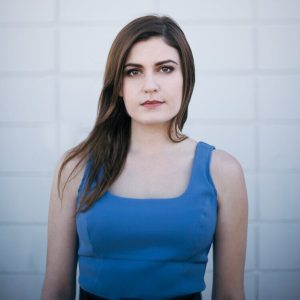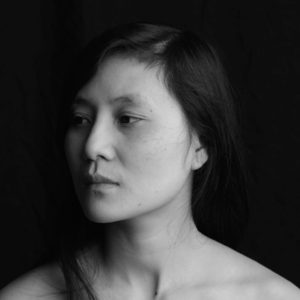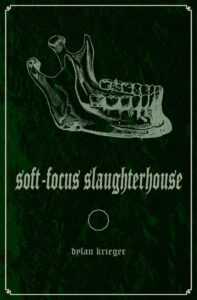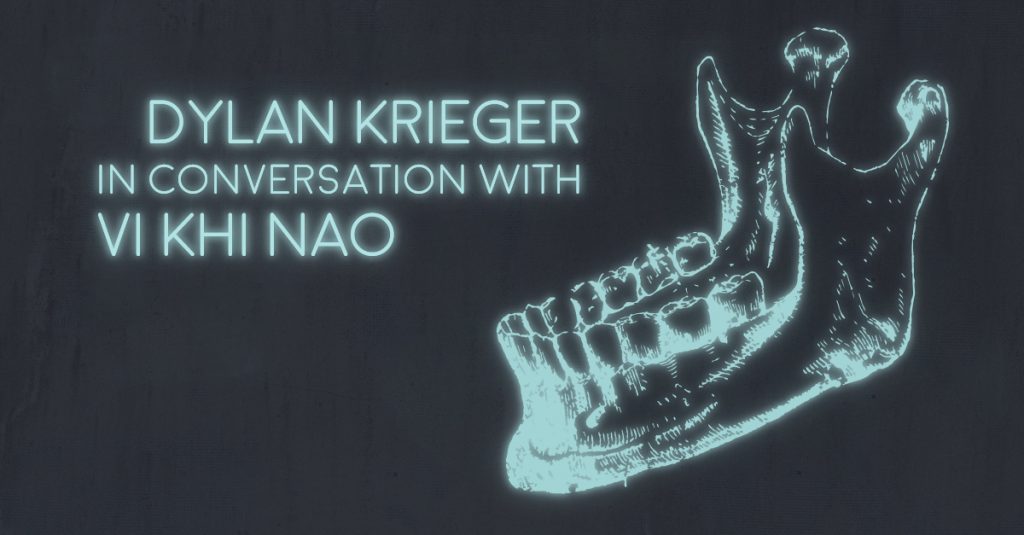 |  |
VI KHI NAO: Your bios over the years read like a poem: “Dylan Krieger is a transistor radio, a poet, a performer, a repository of high hopes from hell, a pile of false eyelashes growing algae in South Louisiana, an automatic meaning generator writing the apocalypse in real time, a divining rod of ungodly proportions.” Where and when in your life are you not a poet?
DYLAN KRIEGER: Over the course of my life, poetry has slowly permeated more and more of my speech, my encounters, my rituals. There are fewer and fewer places where I am not a poet, places poetry doesn’t touch. I increasingly communicate in poems to the people closest to me. I used to think editing required a different mindset than writing, but I’m not so sure now. My inner editor is pretty wild sometimes, and I often make myself write when I’m not feeling particularly “inspired,” so my experience doesn’t always fit the stereotype of cautious editor vs. reckless inspiration. It’s difficult to draw a hard line. I have trouble telling poetry, “No, you can’t access this part of me.” I have very few boundaries with poetry.
VKN: Why is that? Why do you have few boundaries?
DK: I feel that, if I were to give poetry a hard boundary, I might be limiting myself as an artist. Now, that’s not to say there aren’t topics I just find dull or unappealing to write about, but when it comes to exposing my life to poetry (and vice versa) in new ways—when it feels scary, like exposure—I find it helps me grow creatively and try new things I otherwise wouldn’t have.
VKN: What is dull and unappealing to you?
DK: I usually find descriptions of physical places boring, though they’re so obligatory in novels. I also find cliches boring, but I often try to work with them anyway, to change them slightly and make them new.
VKN: What is your favorite cliché? Or bad pick up lines?
DK: It’s hard to pick just one, but I think my favorites are the ones we accept as normal in the day-to-day, but when we look more closely, they’re so much stranger than we realized. When I wrote my first book, Giving Godhead (Delete, 2017), I was obsessed with challenging Christian cliches I found disturbing but also sort of kinky, like being “used” by God, asking him to “come into” you, etc. I wanted to play up the creep factor by taking them out of the touchy-feely sermon setting and altering the spelling of words like “come” so I could showcase these phrases as I’ve come to know them: an extremely suspect tool of psychological “seduction.”
 VKN: So would you say that making them new—clichés that is—say a full pitcher of water sits next to an empty glass of water and turns its nose and says to the glass, “where have you been all my life?”—Is that how you make them new? Or do you have something else in mind? When you say “make them new”?
VKN: So would you say that making them new—clichés that is—say a full pitcher of water sits next to an empty glass of water and turns its nose and says to the glass, “where have you been all my life?”—Is that how you make them new? Or do you have something else in mind? When you say “make them new”?
DK: In Soft-Focus Slaughterhouse, for example, there’s this jokey title, “what doesn’t kill you…will eventually.” It’s sort of a deflation of the hopeful cliche a reader might anticipate from hearing the original phrase before. And it usually gets a laugh at readings, but it’s also very sad, almost defeatist. I think Soft-Focus rides that line between comedy and tragedy, perhaps a little more vulnerably than my other books.
VKN: In your Kenyon Review interview, you declared that The Mother Wart is “by far the most autobiographical book” you’ve ever released. Is Soft-Focus Slaughterhouse now the most autobiographical? Why is it more vulnerable?
DK: The Mother Wart and Soft-Focus do both have deeply personal (autobiographical) themes. In The Mother Wart, I went “edgy” by sharing those personal experiences through the framing of the controversial Church of Euthanasia. But with Soft-Focus, I felt so internally exposed that my primary concern was avoiding a tone of solipsistic wallowing in self-pity about chronic pain. I wanted to pay attention to relationships, not only because the interpersonal challenges of being in pain all the time can be heartbreaking, but also because staying by someone’s side and honoring their needs is often all we can do for their suffering. Pain is naturally isolating, so I strive not to forget “those who take care.”
VKN: A lot of your titles from this collection exist as two word combos: “nymphone home,” “blushing biopsies,” “basal burn,” “dylan downer,” “meat/maker,” “dentist’s diagnosis,” “sisyphean surgery,” “tension tending.” Did you also want the words not to feel isolated? To see their “coupling” through? Was it done intentionally—like a gym buddy, but for words and language? Do words help each other through the pain of existence?
DK: I really like that interpretation; I find two-word or longer titles’ dynamism and capacity for “play” more interesting than one-word titles. On the other hand, I heard a writer once point out that if a title is longer than two words, it’s usually reduced or shortened to two words in common speech. I’ve found that to be true with my own book titles, so two words is a sweet spot. But lately I’ve been experimenting with really rambling, long lines you wouldn’t expect to see as a title. I get restless and can’t help but mix and match the loneliest words to see what they do to each other in close quarters.
VKN: Could you give us an example of such rambling?
DK: I just revisited one such poem called “autopsy reveals lasting marriages mostly composed of sharp metal in a theoretical vacuum.” The longer form opens up possibilities for parodying news headlines and other kinds of writing, but also for setting the tone for the rest of the poem. It’s a bolder kind of trumpeting for what’s to come than most titles, which I like.
VKN: I accidentally misread your poem’s title as “autopsy reveals lasting marriages mostly composed of sharp objects in a thoracic vacuum.”
DK: I think that also works! It could almost be a prompt: “Write what you think lasting marriages are composed of.” Anyone could give it a try.
VKN: Going back to The Mother Wart, that book is about taking deliberate steps not to give birth. But with six books released into the world within three or four years, you are chronically gravid with books and language. To reference Russo and the de-motherhood in its repulsion and attraction, when you give birth to books, do those philosophical and political impulses also enact such binary for you? Or is it different?
DK: I imagine physical birth as a culmination of anticipated intimacy, but sometimes releasing a book doesn’t feel that way (and I assume physically giving birth sometimes doesn’t either). I often feel very distanced from the poems in a book by the time it comes out, like looking at old pictures, a different version of myself, with all the varying degrees of affection and embarrassment. So the binary of repulsion and attraction is there, but there’s a sense of remoteness from the original environment and from the feelings that originally gave rise to the work.
VKN: Which child is your favorite of your five children (if you had to be a partial mother)?
DK: I’m a fickle mother. My youngest is always my favorite. I’m constantly trying to overcome that layer of distance (from writing to publication) by unleashing new work into the world while I’m still saturated in it. I think that’s why I send poems to my closest friends now, sometimes right after writing them.
VKN: Is that what you are currently working on? Or are you referring to Soft-Focus?
DK: Of my first five books, Metamortuary would be my favorite. But I think Soft-Focus is more focused (ha), and it has less of that “old photo” distance, since I wrote it more recently. The title of Soft-Focus, like the poem you mentioned (“blushing biopsies”), is something of an oxymoron, or at least an unexpected pairing—one element being pretty and dreamy and the other being brutal. I’m very excited about this book, but I am even more excited about my works in progress, which is encouraging—hopefully I’m still improving.
VKN: Is that the child that is divided into four parts?
DK: Yes, Metamortuary and The Mother Wart are each divided into four parts. I wrote them back when I was neatly outlining manuscripts before starting them. I would write all the titles before writing a single poem, almost like a list of prompts that I could return to if I ever got stuck. It really helped me at the time, but I’ve used that strategy less and less since writing Soft-Focus.
VKN: Why are you using that strategy less and less? Speaking of pairing, since your work is both mythological and biblical, which two biblical figures do you think should date each other? And why?
DK: Hmm, wow. I love this question. I’m gonna go real satanic and say Eve and the snake should date. Adam seems boring. Adam gets friend zoned.
VKN: He is boring? What is your definition of boring? And, why Eve and the snake? Aren’t they already dating?
DK: I thought their relationship was never official like that, but maybe that’s open to interpretation. I just think Satan gets a bad rap in the Bible and I’d like to see him get laid in paradise. Sounds like a good plot twist.
VKN: What is sexual pleasure for a snake? Giving Godhead is pleasure for god, but what is the equivalent for a snake?
DK: I think that’s what is so enthralling about religious texts. God is sort of this amorphous cloud of power, but he also appears as a man. There are angels that are just wheels of eyes, and then angels that look like men. Sometimes Satan is a snake, but maybe he’d be an angel of light in bed. One can dream. Ha.
VKN: Of course. Your work does not shy away from sex, from the profane, from the grotesque, from the sacred. What is sacred for you, Dylan? Something that has not been tarnished by fundamentalist Christianity?
DK: For a long time—when I wrote Giving Godhead, for example—I would have said I didn’t hold anything sacred. And I still believe it’s good for our sanity to question what we hold sacred and whether it’s actually helping us or anyone else. But now, I can look back and say that a lot of my anger toward religion was rooted in the fact that it wasn’t holding the same things sacred as I do. It treated relationships and even people as expendable, if they didn’t believe or conform to its behavioral standards. So, now I’ll admit it: I do hold non-hierarchical, mutually respectful, intimate bonds sacred, and I think major religions often undermine those relationships to uphold their hierarchies.
VKN: When I read up on you for this interview, I found a Dylan Krieger who plays men’s basketball as a forward.
DK: Did you see the Quarter Life stuff? It’s this short-lived TV show where the main character was a writer named Dylan Krieger. I never saw it, but reading about it made me feel…watched.
VKN: I haven’t seen it, but I am glad you are the main character in Quarter Life, that your name could live elsewhere. I think poets who write poetry and play basketball can be an exciting, contagious theme (Natalie Diaz). Are you athletic at all? Do you play any sports? I have never met you in person before, but based on your poetry and your poetry readings, I think you would make an excellent hockey player! Puck and punk!
DK: I don’t think anyone in my life would assume I was athletic, but I actually did love to play softball and soccer as a kid. I had fewer opportunities to play organized sports because I was home-schooled, but I had a pretty steady “backyard baseball” ritual with my dad—at least until I got old enough to pick his brain about philosophy and music history instead. If I had been raised even 50 miles north of South Bend, I would have been in Michigan—close enough to Canada that hockey probably would have been a part of my childhood.
VKN: Your work deals with the mother theme a lot, and your father theme might be God, but have you thought about devoting an entire collection to the father theme? What is your relationship with your father like? Based on some of the interviews I read, I was under the impression that your parents don’t read your work. Would you ever write a collection just for them, with your parents being your ideal readers?
DK: I actually started writing a novel last year that I wound up abandoning for a poetry project once the pandemic hit. So far, the novel is basically a mix of auto-fiction and speculative fiction, and my dad and I are the main characters. Since it’s prose, I think there’s a better chance he’d read it and enjoy it. In many ways, I’m thankful that they usually don’t read my poetry, because it gives me more room to talk about my childhood without it feeling like a confrontation or personal attack.
VKN: I can understand that—the desire for freedom and anonymity from parents. Why did you abandon the project? Is the novel form too verbose? If your work had to be censored, which institution or structure would you desire that censorship from?
DK: My problem with the novel form is the planning it requires, paired with my limited attention span. Poems are usually the perfect length and intensity to grab and hold my attention. It’s difficult to sustain that intensity for an entire novel, and I’m not sure if you’d want to, but I always end up sounding like a poet anyway, even when I write prose. When it comes to censorship, we actually tried to get some negative press for The Mother Wart by emailing major televangelists, warning them that the book was pro-abortion satanist trash that they should condemn on their programs. We were aiming for getting that “(no such thing as) bad press.” I wouldn’t mind being censored or condemned by the/a church. But I’m just one little poet, and they’re age-old institutions, so I don’t think I am considered a threat. 🙂
VKN: I am sorry you haven’t been censored properly! It would have been an amazing publicity stunt. You have been published by a variety of presses (never one twice). How do you find homes for your work? And how did you find 11:11 for Soft-Focus?
DK: It’s really been different every time. With some of my presses, I had gotten an introduction and an invitation to submit. With others, like Delete and 11:11, it was pretty much a cold submission. But with 11:11, I do remember Andrew reaching out to me over social media with very heartfelt condolences when one of my friends died, and I remember thinking, “This press seems like good people.” They also make impressively detail-oriented, visually striking art. But the “good people” part is more and more important to me these days. I want to work with people I trust who also share my vision.
VKN: Andrew is very lovely and awesome, isn’t he? I love his intensity. Why is the “good people” part more and more important to you these days?
DK: It only takes one bad experience with publishing to make you think of it differently. When I was younger, I was so desperate to get my work out there, I truly would have signed a contract with anyone. It’s good to become more selective than that—to really think about what you want to say and how you want your work to look and exist in the world. Finding a press you can trust is so instrumental to that process, because it’s a collaboration—and a far more involved one than just passing a notebook back and forth. I rely on other creative people so much to bring my poems to life, and I try to stay very aware of how much trust is involved in that kind of collaboration.
VKN: That is wise, Dylan. I really love the cover and table of contents in Soft-Focus Slaughterhouse. (I wish more tables of contents were this exciting!) I know Mike Corrao, 11:11’s in-house designer, designed the book. Can you talk about the design component of it, and is there a favorite poem of yours from this collection? One that you return to again and again for comfort or peace of mind or momentum of creativity?
DK: Thank you about the design! I love what Mike did, too—especially with the table of contents. The overall medical theme was his creation, but I selected the jaw bone as the cover image, since that’s the nexus of my pain condition, and I thought it was a haunting image all by itself like that, centered and enshrined. As far as a favorite poem goes, I like returning to “love is wanting to die together” and “spectrum sensitive.” They’re both poems with a glimmer of hope, whether that hope resides in finding the ultimate romance or simply feeling sensory pleasure so intense it might balance out the pain. I’m glad this kind of nuance made it into the book, alongside and in contrast to the sense of defeat pain brings.
VKN: So, for the readers—if they were to chew on something while reading your jaw book, what should they eat? I get the impression that you love breakfast/diner food, but what would be a good meal to go along with your book? As they are consuming your work that deals with chronic pain, what is something they could chronically consume as well—to be in conversation with you and your poetry?
DK: Maybe this is too literal an interpretation, but I’ve gotten a lot of responses to the poems like, “Wow, I have TMJ, too,” so if you’re one of those people, go with a softer breakfast food like shrimp and grits. I think bruxism and TMJ symptoms are more common than we realize; I just happen to have a very bad case. My official diagnosis is “anterior jaw dislocation with reduction.” I can actually swing my jaw out of joint, and I have nerve damage in my scalp and extremities that makes touch unpleasant sometimes, but I luckily don’t have limited mobility (yet). The condition can be aggravated by tough foods like crusty breads, though, so stay away from those—if you share these issues, that is.
VKN: Do you edit your work heavily, Dylan?
DK: I self-edit pretty heavily, but I don’t have a trusty sidekick editor like some of my writer friends have. Maybe that’s a level of trust I haven’t reached yet.
VKN: Would you like one? If there is someone from history that you could always have access to, editing-wise, whom would you choose?
DK: If we’re going for a dead poet, I might say Mina Loy. She would give me the weird word, the unexpected word. It would lift me out of predictability—that’s how I imagine the power of her influence.
VKN: You can accidentally write limericks or metered poems. Are their other accidental talents of yours we should know about?
DK: It’s true; I think I have an almost compulsive proclivity for ending poems in song. Even if they’re not otherwise in meter, something tells me to end that way. I’m not sure if my other talents are as unconscious/accidental, but I did grow up singing, harmonizing, and sight-reading music a lot. As a friend once said, a “musical demon” lives inside me and comes out in my poems to make music out of words.
VKN: Do you think it’s a result of being home-schooled and raised by musical parents?
DK: Yes, I’m sure I would have still loved music even if my life had been different, but the way it turned out, music became a sort of bonding ritual. Sometimes we fought over it (I was always too loud and my sister was always flat, according to my mom) but music made intuitive sense to me, more than math or science or history or even language at that point. Making language into music eventually seemed like the natural evolution of that intuition.
VKN: I want to end this interview by asking about this poem: “love is wanting to die together.” Where and when did you write it? Where were you in life? What provoked it? And, what do you think about love poems? Should we all become “proverbial flowers” to be pressed by two pages of a book? I love how its opening—“eyelash to eyelash”—evokes intimacy before “unembarrassed” reverberates it.
DK: I was actually extremely single when I wrote this book—which might be surprising, given the number of love poems in it. Chronic pain is one of many particular predicaments that can make us feel “hard to love,” so the prospect of deep personal or romantic intimacy is related to my self-perception as a “spoonie.” In the context of chronic pain or illness, love might look more like a physical therapy session than like an epic romantic adventure. I’ve always thought choosing a partner is kind of like choosing a family member—it’s that day-to-day, mundane level of closeness—and there’s something so bittersweet about the notion that the best possible ending is dying together. Love poems might seem overdone historically, but it’s just one of those topics, like death, like sickness, like pain. It never goes out of style, because it still haunts us.

